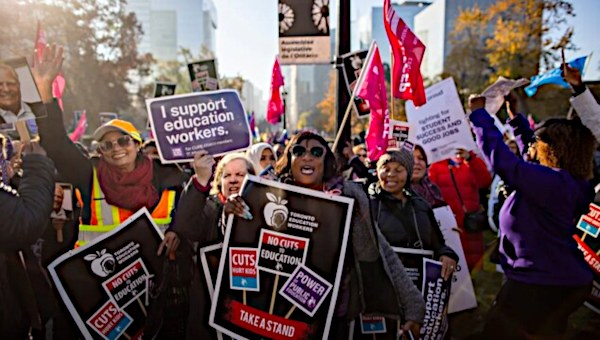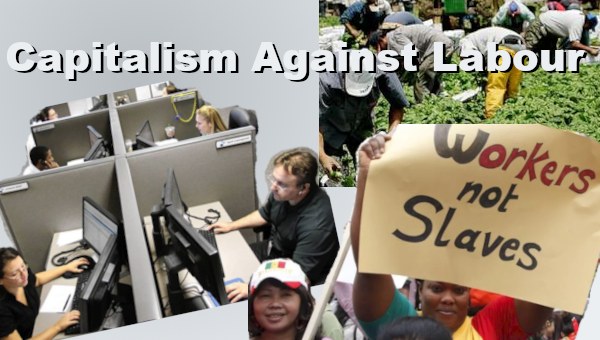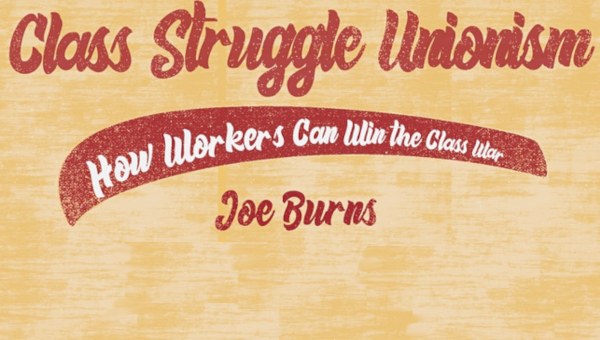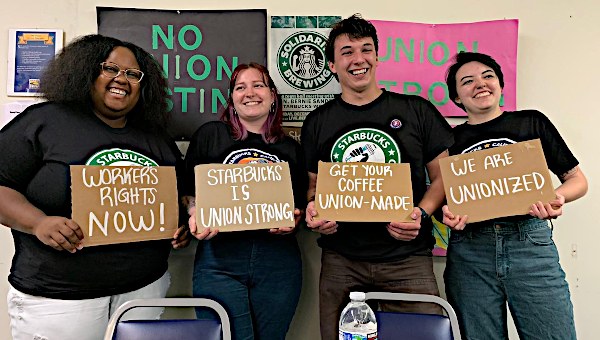No Politics But Class Politics: Class, Identity, Inequality
In his recent book, Poverty, by America, Matthew Desmond writes, “Poverty might consume your life, but it’s rarely embraced as an identity. It’s more socially acceptable today to disclose a mental illness than to tell someone you’re broke.”1 The striking thing about this statement is the degree to which it is both completely true and totally wrong. For one thing, it makes sense that poverty is rarely embraced as an identity – namely, because it isn’t one. It’s a material condition produced by inequality. And while there are undoubtedly widely shared experiences that emerge from poverty, it’s unclear why anyone would want to celebrate these as an identity.
Indeed, as Desmond’s next sentence reveals, poverty is painful, demoralizing, and often shameful. This is why he compares the stigma of poverty to the stigma of mental illness. But this comparison isn’t right either, because while it’s true that poor people shouldn’t be made to feel badly about being poor, the real injustice of poverty isn’t the stigma; it’s that you’re poor, and that your poverty is a necessary condition for the wealth of a much smaller fraction of people. Getting everyone to feel more accepting of poor people will not change this fact.
Class, Poverty and Solutions
A recent example of this is the competing “white working class” narratives that dominated the 2016 election media coverage, when a great deal of energy was wasted on deciding whether it was better to condemn impoverished white people as deplorables or pity them as victims. Both positions treated white poverty as a function of identity, which meant both were compatible with doing nothing to make the lives of those people in poverty any better. Looking down on someone for who they are or what they believe is obviously reconcilable with not wanting to help them. But it’s equally possible to sympathize with someone’s pain, to recognize and demand solutions to their struggles, and nevertheless support a politics that does very little for them. This, after all, describes the platforms of both the Republican and Democratic parties for many decades.
All of this is not to take a shot at Desmond, who writes eloquently about poverty and eviction. But I begin with it because it illustrates the increasingly common way class is transformed into an identity category, by both liberals and conservatives alike. This transformation is incorrect factually, but also problematic politically. Addressing an injustice connected to identity, like a mental illness, is fundamentally different from correcting the injustice of class inequality. This is evident in the mission of the Equal Employment Opportunity Commission, which investigates discrimination related to “race, color, religion, sex (including pregnancy, gender identity, and sexual orientation), national origin, disability, age (40 or older), or genetic information.” Noticeably absent from this list is “wealth,” which, if you are committed to thinking of class as an identity, should be a problem. Because people without wealth are denied jobs all the time, we just happen to describe this as competition. It’s also not really discrimination when an employer gives a job to someone whose wealthy family has provided them with a better education than you. That’s called meritocracy, and it’s a very good thing, at least according to the people who happen to benefit from it.
This is hardly surprising, and perhaps even tautological. In a capitalist society, laws are written primarily by and for the protection of financial institutions, and laws that help the poor are laws that are bad for those institutions. But what it does politically is produce a tendency to frame problems in terms of identity, which our laws recognize as a protected category. As Adolph Reed Jr. puts it, “Legal remedies can be sought for injustices understood as discrimination on the basis of race, gender, or other familiar categories of invidious ascription; no such recourse exists for injustices generated through capitalism’s logic of production and reproduction without mediation through one of those ascriptive categories.”2
The relevant takeaway from this, however, is that such remedies, while morally correct, still function as class politics. They just happen to be completely compatible with the politics of the ruling class, who will concede to no longer discriminate against workers so long as they can continue exploiting them.
Class and Identity Tensions
Anyone familiar with Reed’s work will likely recognize this argument. As a critic, he has spent the last few decades writing extensively about class, identity, and left politics. In No Politics But Class Politics, a collection of published essays by Reed with frequent collaborator Walter Benn Michaels, the political tension between class and identity is examined through a number of lenses ranging from labor struggles to aesthetic production. In light of the ongoing political debates surrounding Critical Race Theory, affirmative action in higher education, the racial wealth gap, and reparations, the fifteen essays collected in the book offer a stark rejoinder to what at times feels like a futile cultural impasse that ultimately amounts to a lot of hand wringing.
Critics of Reed and Michaels, of which there are no shortage, have dismissed their approach as “class reductionist,” or “class first,” as Ta-Nehisi Coates described Bernie Sanders’s rejection of reparations during the 2016 election. Implicit in the framing is the accusation that such an approach is insufficiently recognizing and prioritizing the legacies of racism, sexism, and other forms of discrimination. Reed’s response to this, which for skeptics might ultimately amount to the same thing, is that:
“of course racism persists, in all the disparate, often unrelated kinds of social relations and ‘attitudes’ that are characteristically lumped together under that rubric, but from the standpoint of trying to figure out how to combat even what most of us would agree is racial inequality and injustice, that acknowledgement and $2.25 will get me a ride on the subway. It doesn’t lend itself to any particular action except more taxonomic argument about what counts as racism.”3
The claim that something is “class first” is ultimately a claim about what it isn’t, namely “race first.” To be clear, this is the prevailing analytic of our time, for both racists and anti-racists alike. Race is a powerful category that offers convincing explanatory power for the disparate outcomes we witness all time: police violence, poverty, health care. What else can explain the fact that Black women, on average, are paid 63 percent of what non-Hispanic white men are paid? And the answer is that race and gender do play a role in this outcome – it would seem strange that such an outcome could be produced completely accidentally on such a large scale – they just don’t happen to have anything to do with why those wages are so low in the first place.
Michaels offers perhaps the clearest formulation of this argument, which is worth unpacking:
“It’s importantly true that racism and sexism have played the central role in selecting the victims of American inequality, but it’s also true and just as important that they have not played the same role in creating the inequality itself. Paying workers less than the value of what they produce does that.”4
In a political and cultural climate dominated by neoliberal logic, like our own, this distinction makes no sense. Individual outcomes of inequality obscure its structural causes, and so we are encouraged to respond to those outcomes in a way that does nothing to address the underlying structures. In “Women of Color and the Wage Gap,” for example, a report released in 2021 by liberal policy institute Center for American Progress, the authors examine the “drivers” of the pay gap. One driver they note is the “differences in industries or jobs worked.” Women of color, they write, “disproportionately work in jobs within the service, care, and domestic work sectors – jobs with historically low pay. This is due to occupational segregation, which is the funneling of women and men into different jobs based on gender and racial norms and expectations.”5
Two things are worth mentioning. The first is that this passage perfectly restates Michaels’s argument: gender and racial norms play a fundamental role in the fact that women of color disproportionately work in low-paying industries, what they call “occupational segregation,” but they don’t explain why those industries have historically low pay at all. This fact, the fact of low wages, is caused by lack of widespread bargaining power and job precarity. Employers can pay you very little if someone else is ready and willing to replace you, especially if your job is one of the many “unskilled” jobs reserved for the working poor. The second thing worth mentioning is the report’s use of the word “disproportionately,” which does a great deal of conceptual work. The logical implication – Reed and Michaels have been pointing this out for a long time – is that if the men and women working these difficult, low-paying jobs were represented “proportionally,” which is to say if fewer Black women and more white men worked them, the problem would be solved.
Which is exactly what the report demands: “To begin to close these gender wage gaps, Congress, the Biden administration, and other policymakers must take strong, concerted action to promote equal pay.” Even the one-sentence mention of collective bargaining merely notes “evidence that unionization can help narrow gender wage gaps within a workplace.” When faced with, say, a Sanders-style option of making existing jobs better – so that they guarantee a living wage, benefits, and job security – or swapping out workers to match the racial and gender breakdown of the US census and avoid discrimination lawsuits, employers are not really faced with an option at all. If anything, as Michaels writes, it only strengthens their power:
“Equality of opportunity doesn’t mitigate inequality, it justifies it. Its primary beneficiaries are not employees but employers who, liberated from their own prejudices, now get to hire the best and the brightest rather than the mediocre but the whitest, and – as the neoliberal economist Gary Becker recognized decades ago – once the eligible workforce is increased, employers get to decrease that workforce’s wages.”6
Producing and Reproducing Inequality
Discrimination is unequivocally wrong, and because it’s unequivocally wrong it makes complete sense to fight it. The problem is that having a morally correct motivation, like racial and gender equality, in no way guarantees an outcome of economic equality, even if that’s your goal. This is because capitalism is ultimately indifferent to individuals and their moral sentiments. As Marx notes in Capital, the capitalist is only capital personified, and the same is true for workers and others reproducing the class structure. They are placeholders in a role. And while there are any number of moral justifications for those roles, the actual class relations that produce and reproduce inequality are an objective fact. They work the same in a racist society as they do in a non-racist one.
All of this is irrelevant, of course, if you just want to close the wage gap or correct other disparities in outcome. In this case, there is no contradiction between your stated aims and the approach to achieving them. It’s also irrelevant if you’re like many progressive idealists who certainly imagine loftier change but are cynical enough to accept that such change will never happen. In that case, the perfect is the enemy of the good: a little bit of progress is better than nothing. These are perfectly reasonable positions to hold, because, like people who tend to hold them, they aren’t particularly radical. They certainly aren’t what anyone other than deranged Fox News hosts would call socialist, or leftist.
But if your stated aim is to eliminate economic inequality, even a more radical policy like reparations, which many socialists support, does in fact contradict this aim. Consider the San Francisco Board of Supervisors’ vote to accept a draft plan of reparations recommendations that include a one-time payment of $5-million, the complete discharge of all personal debts, a guaranteed income of $97,000, and the ability to purchase any home in the city for $1. The first and most obvious issue with these policies is that they are reserved for “eligible” residents, which is to say that some number of Black residents who can’t prove their eligibility will get nothing (as has been the case in Evanston, Illinois, where a more modest reparations program has actually been enacted). And while reparations would certainly help some poor Black residents, it would do nothing for the remaining Black residents, or poor residents of other races, a significant number of whom are either homeless or a missed paycheck away from finding themselves there. Ultimately, it’s unclear what San Francisco’s reparations proposals would do outside of creating a more diverse class of property-owners.
Socialist and Universal
This is why Reed argues that “race politics is not an alternative to class politics; it is a class politics, the politics of the left wing of neoliberalism.”7 Even the most ambitious of targeted proposals, like reparations, function not to eliminate the inequality produced by capitalism, but to make it more acceptable. Or, as Michaels puts it, “it tells everybody made rich by capitalism what they want to hear – that the only poverty they need to worry about is the poverty that’s an effect of racism.”8 But the crucial point isn’t that those Black residents shouldn’t receive things like a discharge of all personal debt and the ability to buy a home for $1. They should receive them, but so should every resident. Socialist politics are, or ought to be, universal. The struggle to decommodify housing, education, and health care – to not just raise wages but move beyond wage-labor completely – is a struggle for which being “eligible” makes no sense.
The issue of reparations is an emotional one, primarily because it is inseparable from the profound moral injustices of slavery, Jim Crow, and beyond. It’s reasonable to assume that discussing the best approach to addressing the effects of these injustices would be difficult. But when actual policy proposals differ only in degree rather than in kind from a mainstream institute like Center for American Progress, we might question who ultimately benefits. Rich white people, who make up the majority of the capitalist class, are almost always immune to any politics that emphasizes disparity of outcomes. In this sense, they benefit from the causal mechanism being shifted from class exploitation to racial discrimination. And while it’s true that such politics would benefit some people of color, it’s likely many would find no meaningful change from the unjust conditions they have been forced to accept as everyday life. For anyone committed to true equality, this is simply not enough.
“You definitely know you’re in a world that loves neoliberalism,” Michaels writes, “when the fact that some people of color are rich and powerful is regarded as a victory for all the people of color who aren’t (and when this, indeed, is regarded as a victory for justice itself).”9 This, after all, is why the book is titled No Politics but Class Politics. Any other sort of politics is not much of a politics at all. •
This article first published on The Brooklyn Rail website.
Endnotes
- Matthew Desmond. Poverty, by America. (New York: Crown, 2023), 21.
- Walter Benn Michaels and Adolph Reed, Jr. Edited and with a foreword by Anton Jäger & Daniel Zamora. No Politics But Class Politics. (London: Eris Press, 2023), 34.
- Ibid. 47.
- Ibid. 113.
- Robin Bleiweis, Jocelyn Frye, Rose Khattar. “Women of Color and the Wage Gap.” Center For American Progress. November 17, 2021.
- No Politics But Class Politics, 138.
- Ibid. 145.
- Ibid. 198.
- Ibid. 156.






